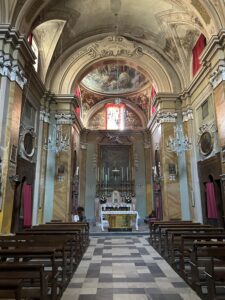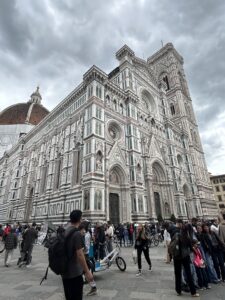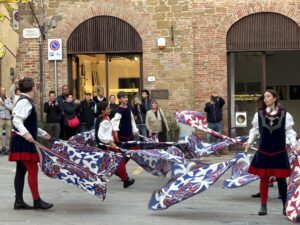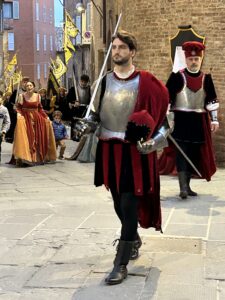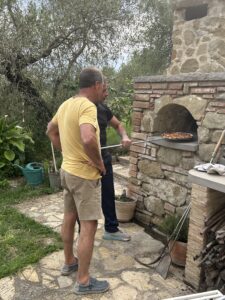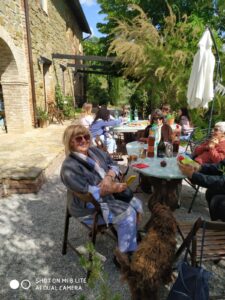Ancient places often have ancient names, and in Italy, the names of some of the medieval hilltop cities often reflect the simplicity of an era long, long ago. “Civitavecchia” simply means “old city.” “Civita di Bagnoregio” means “city by Bagnoregio.” “Castiglione del Laga” means “castle by the lake.”
“Citta della Pieve,” where our Italian house is, means “city of parishes,” and for good reason. In this relatively small town, there’s more than a dozen churches, almost exclusively Catholic. Dan and I have been inside five of them, all sizable. They’re big and beautiful… and with the population of our small town, I have no idea why they needed so many of them. One large church currently seems to dominate as functional. Others appear to be merely museums.
Clearly, Roman Catholicism is the dominant religion in all of Italy, reflected in the many stunning and magnificent cathedrals [“duomo”], as well as the various ritualistic processions. On Palm Sunday, a long processional of parishioners carried the largest palm branches I’ve ever seen– probably ten feet tall– mingled with olive branches symbolizing peace. It was a lovely processional. On Good Friday, however, we were fast asleep at 10:30 p.m. when a long candlelight vigil slowly made its way along the street directly below our window, led by a priest in loud, mournful dirge. After a few minutes, I went back to bed and Dan told me later that I missed seeing the corpse being carried. That processional was sober and rather macabre.
A couple of times, we’ve randomly come upon beautiful medieval parades through town with gorgeous costumes, trumpets, drums, and choreographed flag throwing. These are apparently dedicated to particular saints honored in separate sections of the town.
Only 2% of the population in Italy is non-Catholic, and is made up of all other religions combined. Within this percentage, Protestant Christianity comprises only a minuscule half of a percent– which presents a dilemma for those of us in the minority looking for a church to participate in.
Without a doubt, protestant churches certainly are more available in large cities like Perugia, about 45 minutes away from us, or Florence. But when we were looking for a church that we could participate with, truthfully, traveling that far every Sunday morning for a once a week service –as important as we believe our Sabbath gathering is– was only fulfilling part of our need. The church– the “ekklesia” that the Bible talks about– is people. Church gatherings aren’t meant to be a comfortable club where everybody thinks the same way, but a place where iron sharpens iron. Sunday morning gatherings of the people, we believe, are times for mutual edification and instruction in God’s Word, growing and learning, fulfilling the role of a training center for the ekklesia, equipping us in how to live in the Kingdom of God.
The Kingdom of God itself is much broader and more comprehensive than just a once a week service. Faith applies to all of life, with no exceptions. Consequently, although regular Sunday morning meetings were very important, it wasn’t the only thing we were looking for. We needed fellowship. What we had hoped to find in Italy was a Christian community… connection, like the early church experienced. We needed to have opportunities to get to know other Christian believers. As older people living far away from family and friends, we needed the regular support of others in our lives and we needed people that we could likewise support.
Without a doubt, our first priority was to look for a church that was faithful to preach from the Bible as the inspired Word of God without compromise. (Tall order these days, right?) Beyond that, we were looking for friendships we could build with people who were deeply committed to the Faith, humble and eager to grow together in our grasp of understanding the Kingdom of God, and to share in mutual support and encouragement. As it was in the New Testament church, we were looking for fellowship that extended beyond Sunday morning services, as important as they are. We were eager for sharing meals, going out for coffee together, having times of good discussions where ‘iron sharpens iron,’ mutual encouragement, celebrating special events, helping each other when needs arose… and miraculously, we found it in this small medieval town filled with Catholic cathedrals!
In his search, Dan had found the only protestant church in the town– and it turned out to be a very small group of devoted people who gather together to grow in the Word of God, and who practice sincere Christian community. Pastor Giuseppe preaches in Italian, of course, and his British wife Julia translates into English for us. The pastor is well versed in the Bible, and always preaches with the Word of God as his foundation.
Several British expat couples are part of this assembly, and the only current elder, Clive, is a Brit who speaks fluent Italian with a wonderful British accent. The fact that I cannot yet speak Italian is frustrating. “Sto studiando.” It’s very helpful to have many English speaking people in Italy, but there are also wonderful strictly-Italian speaking people both in and out of the church that I long to have conversations with. Nevertheless, this group of both Italian and English speaking believers has excelled in hospitality, hosting pizza get-togethers, meeting for meals in each others homes or in restaurants, helping each other with physical needs, enjoying deep discussions over a cappuccino, singing together, celebrating birthdays and anniversaries…. It was exactly what we were hoping for.
Through this church, Dan and I learned about a small group of homeschooling families who are working hard to start the first protestant Christian school in Italy with comprehensive biblical worldview training as its mission. They’re located in nearby Florence. We began corresponding with a family that is involved in starting this school, and at their invitation, Dan and I hopped on the train to visit the beautiful ancient city of Arezzo –between our house and Florence– and met with them. We had such a wonderful time getting to know this family and hearing more of their mission over pasta and pesto at their home. After, our hostess Leia took us on a tour of beautiful Arezzo– topped off with some very good gelato– before we headed home by train. [ You can see a short video of this mission at https://www.roots.institute/ ]
Then, through a surprising outside source in America, we learned about someone in northern Italy who translates books of sound theology about the Kingdom of God into Italian. Dan had been recommending a particular book to our Italian pastor through this very source, and we were thrilled to connect with the translator himself. The mutual encouragement has been wonderful!
In a country that has such a small number of protestant believers, we have been continually amazed to find others who are active in the Faith. In the process, we are learning more and more about the reality of being the “ekklesia” that God has intended us to be, both in America and in Italy. We are always learning more about the Kingdom of God… and though it may be small right now, the Kingdom of God is definitely alive in Italy.
